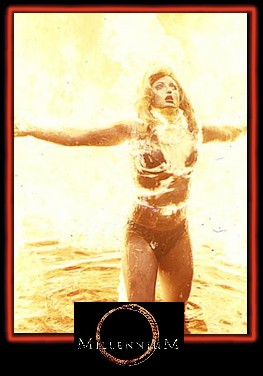

 Directed
by David Nutter. Written by Chris Carter.
Directed
by David Nutter. Written by Chris Carter.
EPISODE RATING: (1 to 4) ***1/2
Frank Black and his wife, Catherine, and young daughter, Jordan, have moved into their dream home in suburban Seattle, free from all the horror and cruelty Frank had been involved with as an FBI agent. However, his peace is soon shattered when a stripper is brutally murdered, and Frank contacts a local cop (and old friend) Lt. Bob Bletcher, and gives him a few words of advise on the case. Suddenly, Frank finds himself back in the grim world of homicides as he and local enforcement attempt to figure out who the killer is, before he can strike again. However, the killer...dubbed The Frenchman by the strippers who've seen him before...is also targeting male hustlers in the area, confusing the PD. Only Frank...with a brief assistance from Millennium Group's Peter Watts...seems to have the answers. He believes The Frenchman is attempting to fulfill a prophecy involving the end of the world.
Pilot episodes are a difficult thing to pull off successfully...creating a compelling story while attempting to introduce us to the key characters and their surrounding. And, happily, Carter and Nutter have pulled it off extremely well. Both aspects are handled carefully and expectedly. We learn a lot about Frank in the opening scenes and closing, with key pieces of information scattered throughout the show. In fact, learning about Frank is ultimately more satisfying than the investigation for The Frenchman. The final conversation with Bletcher about why Frank left the FBI in the first place is a particular standout moment. Carter's script here is even better than the one he provided for the pilot of The X-Files. The Frenchman's crusade is well written and researched, and the biblical connections are certainly in sync with what the show would fully transform into into season two.
What really clicks here though is the surreal imagery experienced by The Frenchman and, by proxy, Frank. The pre-credits sequence hits us with eerie visuals of the stripper victim-to-be dancing in front of bleeding walls. We see fire incorporated into the visions several times throughout the show, and they're never anything short of creepy. Plus the "real life" scenes are striking to look at, with blue tones and shadows perfectly underscoring the mood. It's damn hard to believe that Millennium never received an Emmy nomination for cinematography over it's three seasons; I can't think of a better looking show around at the time. Yet Law & Order (a show I love) won several of them, including one for an episode that's only unusual photography was a 30 second scene in a dimly lit basement. That's just frustrating.
Mark Snow's score is great too, including one thunderous piece. His work on The X-Files is thrilling, but his Millennium output (for the series, not just the episode) is never just a clone. The theme music is haunting in the extreme, and it conveys a true sense of despair and hopelessness. I'm not sure if that's the tone he (and Carter) were aiming for, but that's the way I took it. Either way, it's superb music.
If there's a really noticeable flaw in the episode, it's that the pace slows considerably around the second act. On the flipside, the last 15 minutes are excellent, with a lot of terrific bits...the disturbing discovery of a buried alive victim of The Frenchman...the aforementioned dialogue between Bob and Frank regarding his past...an effective (if cliché) showdown with the killer...and the fade out scene which sets up the season finale. That's planning ahead! Also look out for Stephen E. Miller as second banana cop Detective Roger Kamm. He's a one show character, but the actor would go on to appear regularly as FBI bossman Andy McClaren in the third season.
The rest of the season's merits are highly debatable, but there's no denying that Chris Carter gave us a great spring board for his intriguing and misunderstood show.